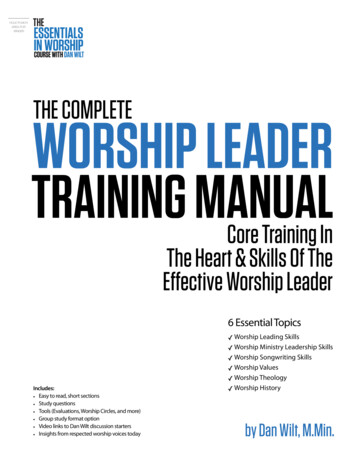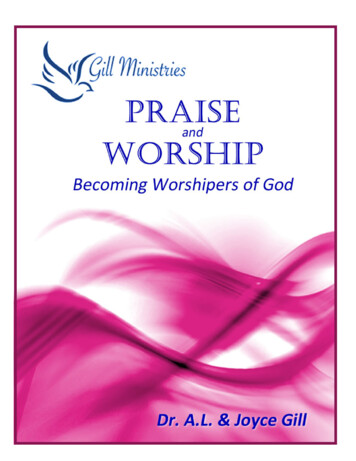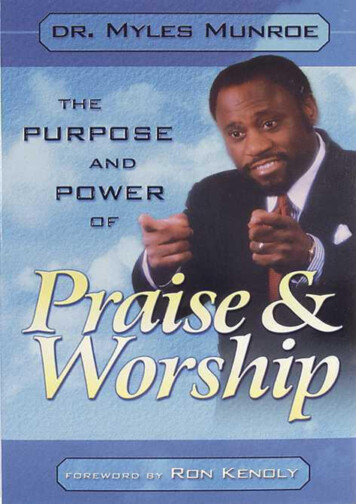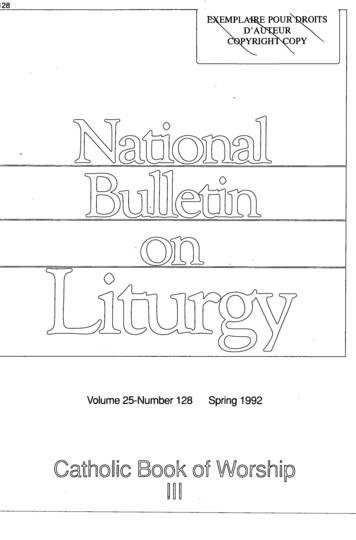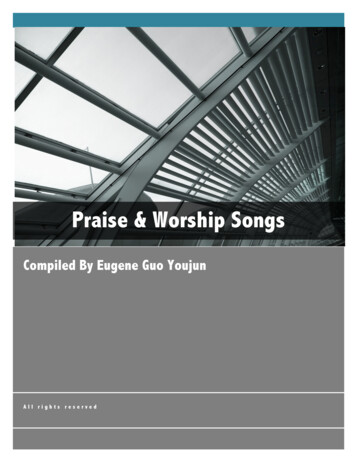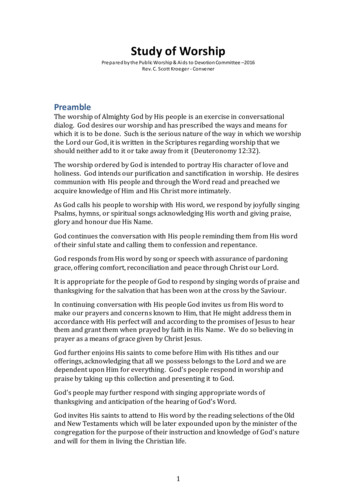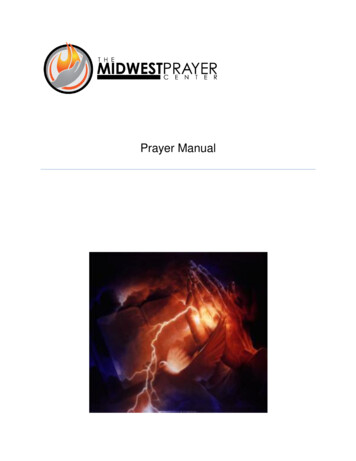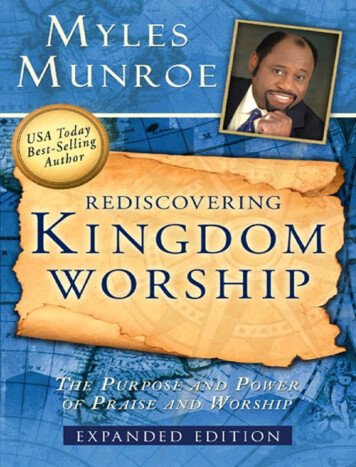
Transcription
Copyright 2010 — Myles MunroeAll rights reserved. This book is protected under the copyright laws of theUnited States of America. This book may not be copied or reprinted forcommercial gain or profit. The use of short quotations or occasional pagecopying for personal or group study is permitted and encouraged.Permission will be granted upon request. Unless otherwise identified,Scripture quotations are from the HOLY BIBLE, NEW INTERNATIONALVERSION . NIV . Copyright 1973, 1978, 1984 by International BibleSociety. Used by permission of Zondervan Publishing House. All rightsreserved. Scriptures marked KJV are from the King James Version.Scriptures marked NASB are from the New American Standard Bible ,Copyright 1960, 1962, 1963, 1968, 1971, 1972, 1973, 1975, 1977,1995 by The Lockman Foundation. Used by permission. Emphasis withinScripture is the author’s own. Please note that Destiny Image’s publishingstyle capitalizes certain pronouns in Scripture that refer to the Father, Son,and Holy Spirit, and may differ from some Bible publishers’ styles. Takenote that the name satan and related names are not capitalized. We choosenot to acknowledge him, even to the point of violating grammatical rules.Destiny Image Publishers, Inc.P.O. Box 310Shippensburg, PA 17257-0310“Sp eaking to the Purp oses of God for This Generation and for theGenerations to Come”For Worldwide DistributionPrinted in the U.S.A.This book and all other Destiny Image, Revival Press, MercyPlace, FreshBread, Destiny Image Fiction, and Treasure House books are available atChristian bookstores and distributors worldwide.For a U.S. bookstore nearest you, call 1-800-722-6774.
For more information on foreign distributors, call 717-532-3040.Or reach us on the Internet: www.destinyimage.com.Study Guide created by Jan ShermanTrade Paper ISBN 978-0-7684-3247-3Hardcover ISBN 978-0-7684-3604-4Large Print ISBN 978-0-7684-3605-1Ebook ISBN 978-0-7684-9122-71 2 3 4 5 6 7 8 9 10 11 / 14 13 12 11 10
DEDICATIONTo the human heart that struggles to find the joy,fulfillment, and satisfaction of God’s presence.To all those believers who desire to experience a deeperreality of the awesome presence in their daily life, and toknow the joy of taking his presence into the world offamily, the world of work, the world of sports, and theworld of life.To my late mother, Evangelist Princess Louise Munroe,my first worship and praise teacher, who is now praisingHim among the heavenly host of witnesses.To Dr. Fuchsia Pickett, a mother in Zion and a trueworshiper, who taught me the value of His presence andthe intimacy of his love.To the late Dr. Sam Sasser, who laid the foundation formy understanding of praise and worship with his life,dedication, teaching, and example. Today I know youpraise him in perfection, Sam. May your legacy be everestablished by your heart of pure praise and worship.To Dr. Judson Cornwall, a man of great wisdom andunderstanding, whose life, ministry, and teaching havebeen an altar on which the fires of worship and praise haveburned for decades. Thanks for the gift of your life.To Mark Bethel, an outstanding minister of praise andworship, whose dedication, passion, and love for God’s
presence stands as an inspiring role model for many. Mayyou always lead others into His presence.To the faithful support of the worship team at BahamasFaith Ministries, especially Beverley Dwyer, Charles andRuth Brown, Lionel Harris, Richard Rahamming, andCrystal Worrell. Continue to lead others into His courts ofworship.
ACKNOWLEDGMENTSThis work is a result of many years as a student at thefeet of many teachers and gifted minds. I am forevergrateful for the inspiration, wisdom, and example of manygreat men and women who, through their commitment andpassion for His presence, have taught me how to love Himalso.I am also grateful for the members and friends ofBahamas Ministries International Fellowship, whose faithfulprayers, support, loyalty, and submission allowed me todevelop the principles and thoughts in this work.For the development and production of this book, I feel adeep sense of gratitude to:My wonderful wife, Ruth, and our children, Chairo and Charisa, fortheir patience, understanding, and support over the years. You make iteasy to fulfill God’s will.Kathy Miller, my gifted and diligent transcriber, editor, and advisor,who again labored with me to bring this work to life. Your ability tocapture the essence of my heart and mind is a work of providence.Elizabeth Allen, for her unwavering support and patient pursuit of mein my busy travel schedule to meet deadlines.And finally, the Object, Subject, and Purpose of my praise andworship, the only One we should worship, the Omnipotent Father andthe Lord Jesus Christ, His manifested presence in flesh, and HolySpirit.
ENDORSEMENTSIt is evident that in every new Kairos (special timing ofGod) He raises up a voice to speak forth, in greater clarity,His predestined purposes and plans for that hour. There isno question in my mind that Dr. Myles Munroe has beenraised up for this momentous hour as a voice to the nationsas well as to his own precious Bahamas.Other writers have written well on the subject of praise. Ibelieve Dr. Munroe’s work, Rediscovering KingdomWorship, will lead the reader into a broader, deeperunderstanding of God’s purpose for praise and worship,and then further into a deeper experiential reality of ourprivilege to commune with our God in His throne room,not only in Heaven, but bowed before Him at the throne ofour hearts.Dr. Fuchsia T. PickettBible teacher, authorBlountville, TennesseeIn this book, Rediscovering Kingdom Worship, MylesMunroe offers a fresh stream of understanding the heart ofGod as it relates to His children. Dr. Munroe feels thatpraise does not lift us to God’s throne; it prepares a placefor God to descend to be with us. Adam never ascended toGod’s throne; God descended to Adam’s garden. Those whoknow the ministry of Dr. Munroe will hear him on everypage, and that hearing will bring a freshness to their lives.
Dr. Judson CornwallPhoenix, ArizonaMyles Munroe is an anointed teacher with a passion forencouraging and instructing the Body of Christ. InRediscovering Kingdom Worship, he reaffirms God’s eternalpurpose to dwell in the midst of His people and teacheshow to invite God’s presence into our lives. This teachingis crucial for all who hunger to live within the veil, there tofind the One for whom their heart longs. Truly, this bookwill challenge you to seek God through praise and tomaintain the conditions that encourage His nearness.Don NoriPublisherDestiny Image, Inc.
TABLE OF Introduction1 God’s Original Plan for Mankind2 Man’s Greatest Need3 Creating a Dwelling Place for God4 The Blessing of Judah5 What Is Praise?6 When Are We to Praise God?7 How Are We to Praise God?8 Why Are We to Praise God?9 The Progression of Praise10 Qualified to Be in God’s Presence11 The Relationship of Praise & Worship12 The Power of Praise & WorshipBibliographyRediscovering Kingdom Worship Study GuideAnswer Key
FOREWORDFrom the third chapter of Genesis to the end of the Bookof Revelation, we find God trying to get His people back tothe intimate relationship He had with Adam and Eve in thebeginning. Because God is holy, perfect, and pure, it isimpossible for man, who has been conceived in iniquitysince the fall of Adam and Eve, to stand in the presence ofGod without an atonement.God gave Moses the plan for allowing Himself to dwellin the presence of His people through the building of theark of God and the tabernacle of God. Through these ritualsand sacrifices prescribed by God, the high priest was ableto come into the presence of the Almighty and representthe people.However, through King David, God shows us He desiresmore than just the blood and sacrifice of selected animals;He desires a pure and contrite heart. Jesus, in His dialoguewith the Samaritan woman, tells us that God is looking forworshipers who will worship Him in spirit and truth.When Jesus taught the disciples the Lord’s prayer, Hesaid “ . Thy will be done on earth as it is in Heaven .” Inthe heavenly experience of Isaiah in the sixth chapter of theBook of Isaiah, and John in Revelation, we see what isbeing done in Heaven continually: praise and worship.Praise and worship has always been the avenue into thepresence of our God. We can talk about Him, do things for
Him, and even pray to Him, but it is only through praiseand worship that we are allowed to be in the presence ofour Great Creator.In this book, my brother in Christ, my friend andconfidant, Myles Munroe, teaches us:How to praise and worshipWhom to praise and worshipWhere to praise and worshipWhen to praise and worshipThe power of praise and worship The patterns of praiseand worshipThe principles of praise and worship The practicals ofpraise and worship The purpose of praise and worshipThis book is a must read for those who have a passion toknow the heart of God. I prophesy and predict that it willbecome required or recommended reading in manyChristian schools, colleges, universities, and for Biblestudents throughout the world.I am honored to make this small contribution to thisbook. I believe this book is going to be a special blessingto those who desire to live in the awesome presence of ourmagnificent God.Dr. Ron KenolyWorld-renowned worship leader
INTRODUCTION“God came near. I know He was right there with me.”What wonderful words! What a glorious experience! Sadly,such experiences come all too infrequently to most of us.Yet life without God’s presence was not His original planfor us. He designed us to know Him, living in close,intimate fellowship with Him. That’s why life is so difficultand unfulfilling for so many people. We are living withoutthe one thing that is essential for our fulfillment and wellbeing. We are living without the continuous, enduringpresence of God.Whenever you live without a vital, ongoing relationshipwith God, you have no hope of finding true happiness or offulfilling the purpose for which you were born. You simplycannot function properly and effectively outside theenvironment of God’s presence.YOU WERE CREATED TO LIVEIN GOD’S PRESENCE. LIFEANYWHERE ELSE IS ADISTORTED, DISSATISFYINGIMITATION.The purpose of this book is to teach you the conditionsunder which God’s presence draws near to us. For you see,
God’s presence is conditional. He doesn’t come simplybecause we want Him to. He comes when the conditionsare right. Only as we learn to establish and maintain theconditions that He has ordained for His coming, can wehope to know the joy of living in His presence on a daily,moment-by-moment basis.So read and study this book until the principles andtruths taught here become a natural part of your thinking.Allow them to equip and inspire you to create theconditions in your life that will welcome the presence ofthe Lord Jesus Christ and of His Holy Spirit. Then you willgrow and flourish, finding the joy and fulfillment that onlylife in the presence of Almighty God can bring.
Chapter 1GOD’S ORIGINAL PLAN FOR MANKINDGod’s greatest desire as revealed in the Scriptures isfor a family.In the beginning God created the heavens and the earth(Gen. 1:1). Land and seas, plants and animals, birds and seacreatures all came forth at His spoken word.Then God said, “Let Us make man in Our image, in Our likeness, and letthem rule over the fish of the sea and the b irds of the air, over thelivestock, over all the earth, and over all the creatures that move alongthe ground.” So God created man in His own image, in the image of GodHe created him; male and female He created them. God b lessed them andsaid to them, “Be fruitful and increase in numb er; fill the earth andsub due it. Rule over the fish of the sea and the b irds of the air and overevery living creature that moves on the ground” (Genesis 1:26-28).This crowning act of creation was a result of God’s desireto have a family. He wanted someone to be His friend andto live with Him as a son. God’s original plan was that manwould share in His authority and rule, not serve Him as aservant. This is why Jesus Christ is the “King of kings andLord of lords” (Rev. 19:16b), not the King of subjects. Godwas interested in a completely different kind of relationshipthan we normally think of when we talk about a king. Hewanted sons who would not only be led by the King but
who would also exercise the King’s authority and rule onearth.This relationship between God and man is of paramountimportance to God. Creation shows this to be true. The firstthing God gave man was His image and likeness, becausethat was the first thing God wanted man to have. Thesecond thing God did was to place man in His presence,which is the meaning in the Hebrew language of the wordEden. Therefore, God’s greatest desire was that man wouldact like Him and live with Him.GOD WANTED MAN TO HAVE HISIMAGE AND LIKENESS AND TO LIVE INHIS PRESENCE.The word image means “resemblance” (Strong’s, H6754)or “exact likeness” (Webster’s, “image”). Therefore, to bemade in God’s image means that man resembles God and isan exact likeness of Him. He has God’s true nature and Hisspiritual and moral character. In the Scriptures, the wordEden refers to a place of God’s presence (see Isa. 51:3;Ezek. 28:13). So God gave man His nature and then putHim in His presence. These were God’s priorities.God did not establish reverent patterns, pious traditions,or religious activities in the Garden of Eden. There wassimply a relationship between God and man. Establishingand maintaining this relationship continues to be God’sprimary concern. He is much more concerned about our
fellowship with Him than about our works, our activities,our traditions, and even our busyness. God wantsrelationship—that’s the bottom line—and everything Godestablished for man was built on this desire for fellowship.Thus, God created man for a specific purpose: to havedominion over all the earth; with an image different fromthat of all other parts of His creation: His own spiritual andmoral nature; and with the ability to function like He does:seeing things that are not yet visible (faith). The Scripturesclearly show this intent of God that man would be morelike Him than the rest of creation, and that he would thinkand act like God.What is man that You are mindful of him, the son of man that You carefor him? You made him a little lower than the heavenly b eings andcrowned him with glory and honor. You made him ruler over the worksof Your hands; You p ut everything under his feet (Psalm 8:4-6; see alsoHebrews 2:6-8).Truly, the creation of man was God’s greatestproduction, and He described the man He had made asbeing “very good” (see Gen. 1:31). Sadly, what Godintended for man and man’s current experience are quitedifferent. This difference is a result of man’s choice todisregard the principles that are an inherent part of God’screation.
God Is a God of PrinciplesMan’s ability to fulfill his purpose and to be all Godintended him to be is predicated on the requirement that heobey the principles God established when He createdhuman beings. Why is this true? God is a God ofprinciples. Everything He created was established tooperate by certain principles that guarantee its properfunction. This pattern in creation includes human beings.We were created to operate by principles that Godestablished before He created us.These principles or rules of operation for human beingsare found throughout the Bible, although they are notalways referred to as principles. They may also be referredto as God’s laws, ordinances, precepts, statutes, commands,commandments, decrees, instructions, word, and ways.Although the meaning of each of these words carries aslightly different nuance from the others, they all carrywithin them the basic concept of a principle, which is alaw that is established to preserve and protect a createdthing and to assure its maximum performance. So eachtime these words occur in Scripture, the particular wordused may be removed and the word principle may beinserted in its place. These varying words for God’sprinciples can be clearly seen in Psalms 19 and 119:The law [principles] of the Lord is p erfect, reviving the soul. Thestatutes [principles] of the Lord are trustworthy, making wise thesimp le. The p recep ts [principles] of the Lord are right, giving joy to theheart. The commands [principles] of the Lord are radiant, giving light tothe eyes. The fear of the Lord is p ure, enduring forever. The ordinances
[principles] of the Lord are sure and altogether righteous. They aremore p recious than gold, than much p ure gold; they are sweeter thanhoney, than honey from the comb . By them is Your servant warned; inkeep ing them there is great reward (Psalm 19:7-11).Blessed are they whose ways are b lameless, who walk according to thelaw [principles] of the Lord. Blessed are they who keep His statutes[principles] and seek Him with all their heart. They do nothing wrong;they walk in His ways [principles]. You have laid down p recep ts[principles] that are to b e fully ob eyed. Oh, that my ways were steadfastin ob eying Your decrees [principles]! Then I would not b e p ut to shamewhen I consider all Your commands [principles]. I will p raise You withan up right heart as I learn Your righteous laws [principles]. I will ob eyYour decrees [principles]; do not utterly forsake me. How can a youngman keep his way p ure? By living according to Your word [principles]. Iseek You with all my heart; do not let me stray from Your commands[principles]. I have hidden Your word [principles] in my heart that Imight not sin against You. Praise b e to You, O Lord; teach me Yourdecrees [principles]. With my lip s I recount all the laws [principles] thatcome from Your mouth. I rejoice in following Your statutes [principles]as one rejoices in great riches. I meditate on Your p recep ts [principles]and consider Your ways [principles]. I delight in Your decrees[principles]; I will not neglect Your word [principles]. Do good to Yourservant, and I will live; I will ob ey Your word [principles]. Op en myeyes that I may see wonderful things in Your law [principles] (Psalm119:1-18).
Characteristics of PrinciplesSince a satisfying relationship with God, each other, andthe rest of God’s creation is predicated on our obeying Hisprinciples in creation, let’s look now at some of thecharacteristics or properties of principles. Understandingthese properties can help us to understand how principlesfunction in our life.Principles are permanent. When God createdhuman beings, He created them to breatheoxygen. Although many years have passed sinceGod first formed man from the dust of the earth,and man has found many ways to “better” his lifeexperience, man still needs oxygen to survive. Inessence, any environment where oxygen is absentis deadly to man.Principles never change; they remain constant.In the English system of measurement, a yard hasbeen determined to equal 36 inches. Now, youmay create a stick that measures 35 inches longand call it a “yardstick,” but this in no waychanges the principle that a yard is a unit ofmeasurement equal in length to the sum of 36inches. In essence, a stick 35 inches in length isnot equal to a yard no matter what you call it,because a yard, by the principle of its definition,contains 36 inches. In a similar manner,modifications by our society to God’s standards ofconduct do not change God’s law. God’s law is
constant, even as He is constant (see Num. 23:19).Principles work anywhere. One of the laws ofnature is that water freezes at 32 degreesFahrenheit (or 0 degrees Celsius). It doesn’t matterwhether you freeze water at the north pole or atthe equator, water cooled to 32 degrees F(assuming the water is not contaminated withother substances that skew the water’s freezingpoint) will turn to ice. In the same manner, wecan expect that God’s laws apply to us no matterwhere or when we live. His principles areapplicable in all times, cultures, and geographiclocations.Principles protect the product. Thischaracteristic of principles can be illustrated bythe care labels that many clothing manufacturerssew into their garments at the collar or a sideseam. These specifications by the manufacturerregarding the garment’s care may includerequirements concerning water temperature forwashing, line drying versus the use of a clothesdryer, and washing in water versus dry cleaning.The manufacturer provides these instructions toprotect the clothing from possible harm that couldresult in shrinkage of the fabric, color loss,premature breakdown of the fibers, or otherdamage. God’s laws are also intended to protect usfrom harm. Although they may at times appear tolimit our choices, these limitations are always
given by God to protect our freedom and wellbeing.Principles can never be broken. The laws ofgravity state that the mass of the earth, the moon,or another planet will exert a certain pull onobjects at or near its surface. This pull will drawthe objects toward it. With the invention ofairplanes, helicopters, and other modes of airtransportation, one might say that the laws ofgravity have been broken. Such a statement cannever be true because a principle of creationcannot be broken. What can happen is that mandevises various means to combat or redirect theforces of gravity. Then, although the principle ofgravity is not evident in a particular event orcircumstance, the principle itself—that is, the rulethat objects at or near the earth’s surface arepulled toward the earth if they are not in somemanner prevented from doing so—still holds true.Principles, when violated, produce destruction.What seems right to you for the use of a productis not necessarily in agreement with what themanufacturer of a product intended. For example,when you buy an iron, the box it comes incontains a little booklet that lists thecommandments or laws of the manufacturerconcerning its function. These are often called theoperating instructions. They tell you how to usethe iron so you get the maximum performance
from it.Now you could take that iron, plug it into thewall, and put it into the bathtub with you to heatup the water. Since an iron is supposed to get hot,that way may seem right to you: “The iron is hotand the water is cold, so I’ll just put the iron intothe water to make it warm.” Guess what? There’s away that seems right unto man, but the end of it isa shocking experience! Both you and the iron willsuffer damage because of your choice to violatethe iron’s operating instructions (principles).Principles contain inherent judgment. This lastcharacteristic of principles is particularlyimportant. For example, the principle of fire isheat. When you put your hand in fire, you canexpect to get burned because fire produces heat.In other words, you don’t get burned because Godburns you or the devil burns you. You get burnedbecause heat is a principle of fire. In essence, thejudgment—the burn—is inherent in the principle.Thus, much of what we call “acts of God” aresimply judgments that are inherent in God’sprinciples of creation. For example, God haskilled no man. Rather, “the wages [natural result]of sin is death” (Rom. 6:23a). When you playaround with sin and start flirting with things youshouldn’t be doing, you don’t have to worrywhether someone will find you out, because your
own activities will tell onSin contains an inherentviolate God’s principle,contains your discipline oryou. Why is this true?judgment. When youthe principle itselfpunishment.
God’s Use of PrinciplesThe verses previously quoted from Psalms 19 and 119also clearly reveal the necessity of understanding andobeying God’s principles of creation. This is true becauseonly the manufacturer of a product knows what factors arenecessary to obtain the maximum operation of the product.In essence, you can’t use a product according to your ownideas and expect it to fulfill what the manufacturerpromised it could and would do. If you want a product towork, doing all that the manufacturer said it would do, youhave to obey the principles (laws, commandments,instructions, etc.) of the one who designed and made theproduct.God’s demands of us are always based on His principles,because He knows we cannot fulfill our purpose and enjoyfulfillment in life unless we operate within the parameters(principles) He has set for us. The effects of His lawscannot be avoided because they are inherent to the law.Therefore, our relationship with God, both our perceptionof Him and His response to us, is based on how werespond to the principles He has established throughoutcreation. He is not capricious in His responses to us, butrather is “faithful and just” (see Ps. 111:7 and 1 John 1:9).IF YOU WANT A PRODUCT TO WORK,YOU HAVE TO OBEY THEMANUFACTURER’S PRINCIPLES OFOPERATION.
We may prefer lawlessness, which is the freedom to dowhatever we want to do, but our very creation by God, ourManufacturer and Source, requires that we follow Hisprinciples. Should we choose lawlessness—doing what wewant, when we want, how we want—we can expect to reapthe inevitable results, which include slavery, death, and theloss of privileges or freedom. This is precisely whathappened to the man and the woman in the Garden ofEden.
Disregard for God’s Principles Carries ConsequencesWhen God placed the man in Eden, He gave him someinstructions that were to govern his life in the garden. Oneof these instructions concerned what he could and could noteat.And the Lord God commanded the man, “You are free to eat from anytree in the garden; b ut you must not eat from the tree of the knowledgeof good and evil, for when you eat of it you will surely die” (Genesis2:16-17).Please note that this command contains an inherentjudgment. Death is the proscribed consequence fordisobeying this principle. Thus, God’s pronouncement tothe man in Genesis 3:19, “By the sweat of your brow youwill eat your food until you return to the ground, since fromit you were taken; for dust you are and to dust you willreturn,” is nothing more than the logical consequence ofman’s choice to disobey God.DEATH IS THE ABSENCE OF THEPRESENCE OF GOD IN A MAN OR AWOMAN’S LIFE.This physical death that will inevitably claim everyperson, whether in infancy or in old age, is not, however,the only death man suffered because of his disobedience.The more serious consequence of man’s disregard for God’sprinciples for life in the garden was his loss of the Holy
Spirit and his subsequent separation from God. Thisspiritual death, as it may be called, is at the root of all theills that plague us as individuals and as a society. In truth,man cannot and will not live up to the potential andpurpose God built into him until the love and intimacyGod and man enjoyed in the garden is restored. Because lifein the presence of God is man’s ideal environment, God’spresence is also his greatest need. Man cannot truly liveuntil the relationship between God and man is restored.PRINCIPLES1. God created man to share His image and authority.2. God is more interested in relationship than in rules andtraditions.3. Everything God created is governed by principles.4. Fulfillment of purpose requires obeying God’sprinciples.5 Principles contain these inherent characteristics:Principles are permanent.Principles never change.Principles work anywhere.Principles protect the product.Principles can never be broken.Principles, when violated, produce destruction.
Principles contain inherent judgment.6. God’s Word contains the principles that govern men andwomen.7. Disobeying God’s commandments brings natural andspiritual consequences.
Chapter 2MAN’S GREATEST NEEDGod’s greatest desire and man’s deepest need is toshare an enduring Spirit-to-spirit relationship.Since God is a God of principles, everything He createdwas established to operate by certain principles thatguarantee its proper function. So, all created things—whether plant, animal, fish, bird, star, or human being—must adhere to the principles that govern their life if theyare to release their potential and fulfill their purpose. Oneof the most important of these principles ordained by Godto preserve and protect His handiwork and to assure themaximum performance of each created thing is theprinciple of environment.
The Principle of EnvironmentThe word environment is defined as “circumstances,objects, and conditions by which one is surrounded”(Webster’s, “environment”). Therefore, an environment mayrefer to the forces that affect the state of things, thecomponents that make up the climate in which somethingexists, or the conditions in which a thing exists. Everythingin life was created to function within the particularenvironment that God prescribed for it before He created it.In essence, before the moment of creation, God decidedboth what He would make His creation from and where Hewould place it after He had made it. This place designed toindividually suit the makeup and purpose of each thingGod made was its environment. When the environment wasready, God called forth each creation from its intendedsource and put it in the specific environment He had madefor it.So before God created the sun and the moon and themyriad of stars, He first called forth the light and separatedit from the darkness, calling the light “day” and thedarkness “night.” He also made a firmament or expanse toseparate the waters above from the waters below and calledthe firmament “sky.” Only then, after all this wascompleted, did God call forth the lights from the heavensand set them in the sky to mark the day, the night, and theseasons (see Gen. 1:1-8; 14-18).God’s process in creating plants and animals reveals thesame pattern. Before He spoke plants and animals intobeing, He gathered the waters together so that dry ground
The power of praise and worship The patterns of praise and worship The principles of praise and worship The practicals of praise and worship The purpose of praise and worship This book is a must read for those who have a passion to k
